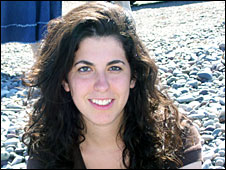As I celebrated Israel’s Independence Day last week, I did so warily. Recalling the night before, the 25,310 Israeli soldiers and civilians who died for this country during the past 63 years of its existence, makes one realize that independence cannot be taken for granted. Independence Day in Israel always falls the day after the country’s Memorial Day to underscore the sacrifices made for the survival of this state.
It is also the day when I recall my childhood visits to my grandmother’s apartment in the Tel Aviv suburb of Ramat Gan. My grandmother’s entire family was killed in the Holocaust — her mother, siblings, nephews and nieces. In her apartment, she had photos of her deceased family covering the walls and the home she left behind. My grandmother, Yonah, or dove in English, never forgot her childhood home in the Polish town of Bledov.
But the only home Yonah would come to regard in her lifetime was Israel. It was the only state in the world she believed that would protect her from the atrocities that destroyed her family in Europe. It was also the Biblical homeland that her religious Hasidic family dreamed of returning to for centuries.
And yet this story was not only exclusive to Jewish people living in Europe. My Israeli friends whose families come from Iran, Iraq, Yemen, Lebanon, Syria, Libya and Egypt, have shared with me similar accounts of the fates of their families. An estimated 900,000 Jews were forced to flee or were expelled by the Arab and Muslim leadership of the Middle East and North Africa in the 20th century. Their homes and properties were never to be seen again. Half of Israel’s population today is made of North African and Middle Eastern Jews (Mizrahim), who left behind well-established Jewish communities, some which had existed for thousands of years in the Levant.
I returned to Israel after I finished high school because I believed that this country was my future, just as much as it was my past and my present. I was born in Jerusalem and no other city in the world will ever feel as home to me as this city. Following the footsteps of my grandfather’s family, who made their home in this city in the late 1800s, has always been my dream. It’s one that I’m still proudly fulfilling today.
But there is a narrative out there that leaves no room for my history or beliefs. It is a narrative that seeks the death and destruction of the Jewish state and manifests itself in many forms. The violent protests of Nakba Day, the historical manipulations found in Mahmoud Abbas’s Monday op-ed piece about Israel in the New York Times and Hamas’s misleading messages, are just a few recent examples.
These events contribute to the perpetuation of two often repeated lies: that the Arab world wants peace with the Jewish State and that Israel returning to the 1967 borders will magically resolve the conflict.
The Six Day War did not instigate the Arab-Israeli conflict; it was the simply the continuation of the Arab nations’ long-term goal to destroy Israel. Indeed, the 1967 War in the Arab world was called an-Naksah or the ‘The Setback.’ A Cairo radio broadcast proclaimed on May 17, 1967, that “All Egypt is now prepared to plunge into total war which will put an end to Israel,” even before the war broke out a month later in June.
Indeed, the term Naqba itself was first used to refer to Israel’s 1948 War of Independence. It was coined by a Syrian historian at the American University of Beirut, Constantin Zureiq in his 1948 book called Ma’na al-Nakba (The Meaning of the Disaster). The disaster in Zureiq’s eyes was centered on the fact that seven Arab nations went out to battle with the goal of eliminating Israel and preventing the partition. Instead they suffered heavy losses and ended up with less territory.
When Ismail Haniya, the Hamas premier of Gaza declared this past Sunday May 15 that the Hamas movement would not recognize the state of Israel, he was not referring to the Israeli borders of 1967. Haniya asked hundreds of worshipers at Gaza city’s main mosque during the dawn prayers, who were there to mark Nakba Day, “to pray for the end of the state of Israel.” He also declared that the “the Zionist project in Palestine must end.”
A very different line from Hamas was said to an American news source, NPR two days later. Hamas’s Deputy Foreign Minister Ghazi Hamad stated that Hamas had moderated its views, was now seeking a peaceful solution to the conflict that entailed “a two-state solution with ’67 borders.”
What to believe?
You can only believe what you experience. On Nakba day this year, a terrorist attack in Tel Aviv involving a truck driver from the town of Kfar Qasem wounded 16 people and killed a 29-year old Israeli man. The driver, Isa Islam plowed through southern Tel Aviv, ramming into vehicles and pedestrians, before crashing into a fence outside an elementary school in the morning. Witnesses reported that the man shouted “Allahu Akbar” and “death to the Jews.”
Later in the day, Arab supporters and Palestinian protestors swarmed Israel’s three hostile borders, with hundreds of Syrian protestors storming into northern Israel and staging violent riots that Israeli officials say were orchestrated by Syria and its Iranian-backed Lebanese ally, Hezbollah.
Nakba Day did one thing this year and that was reinforce hate and incitement among the Arab community against Israel, and strengthen a narrative that offers no peaceful solution — or at least a solution that would recognize the Jewish people’s national rights to live in Israel. Denying the history of millions of Israeli Jews who believe Israel to be their national homeland will forever remain a disastrous tactic in any attempt to resolve this Mideast conflict.
Link: http://www.huffingtonpost.com/anav-silverman/nakba-day-israeli-palestinian-conflict_b_864551.html











